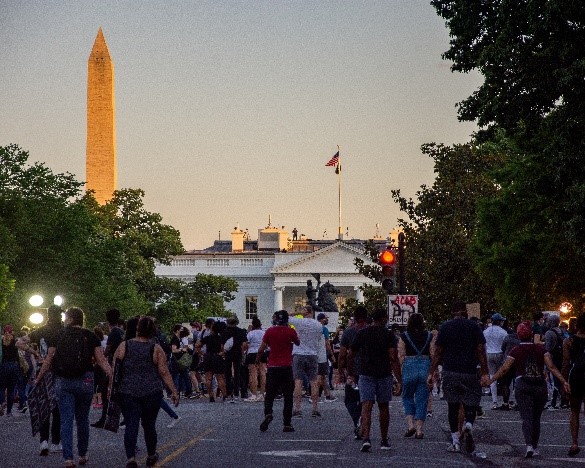
Grief, Anger, and Sacred Imagination
Confronting Injustices in Our Midst
Sister Simone Campbell, SSS
August 11, 2020
Protesters outside the White House in the days following the murder of George Floyd.
The litany of horrors in the last few months has at times overwhelmed us. The murder of innocent Black people and police attacks on peaceful protesters. The pandemic and the failure of the Trump administration to engage and lead. The necessary closing of business to protect each other from the disease and the resulting economic crisis. The effort to respond to the needs of our most vulnerable people brought Democrats and Republicans, House and Senate together for a brief moment as they crafted emergency legislation to respond. More action is needed though, to begin the healing in our nation.
As weeks have gone on, we have learned how the Black and Latinx communities have been disproportionately affected by the COVID-19 pandemic. In Wisconsin, Black people represent 6% of the population and nearly 40% of COVID-19 fatalities. In Kansas, 6% of the population is Black and yet Black people account for more than 30% of COVID-19 deaths. These are the communities who do not have the opportunity to work from home. The Labor Department reported 30% of white workers could work from home in 2017 and 2018, while only 20% of Black workers and only 16% of Latinx workers could do so. The front line workers who work in grocery stores, drive buses, work in hospitals are the most exposed, and their families and communities have paid a high price because of that. Native American communities have some of the highest COVID-19 rates per capita in the country. At the same time, tax revenues from tribal businesses used to operate hospitals and clinics have dropped to nearly zero.
Then we have the murder of George Floyd by the Minneapolis police and all of the reality of centuries of our original sin of racism. I don’t want to write another statement or say another lament, I want to CHANGE this behavior once and for all. Since it began tracking in 2015, the Washington Post has found that over 1,000 people are killed every year by the police and Black people, while only 13% of the population, are more than twice as likely to be a victim of police killing.
Then we have President Trump’s decision to use military force to clear peaceful Black Lives Matter protesters Lafayette Square across from the White House so he could pose for a photo holding up a Bible in front of St. John’s Episcopal Church. He violated both the constitutional rights and sacred human dignity of people so he could get a photo opportunity. To me this was the ultimate exercise of authority to reinforce and flaunt his white privilege.
In our work at NETWORK, we see the structures of white supremacy that have controlled the economic reality AND the political reality in this land since before the founding of our nation. Many of you have participated in our Racial Wealth and Income Gap experience, exploring 12 federal policies that created and perpetuate the inequality in our nation. Many of you studied our Recommit to Racial Justice guide that identifies and confronts the extent of white supremacy in our society, our politics, and our economy. I know that white people, like me, have so much to learn about racism and all of the small and large ways that my actions and my decisions perpetuate racial injustice. It is not a time just to lament, however. As we approach this year’s election in the face of these challenges, we must move beyond lamentation and engage.
In Gaudete et Exsultate, Pope Francis’s Exhortation on Holiness, he calls us to a full engagement to protect the dignity of all life. In this moment in the United States, I believe that dismantling racism must be a foundational part of any pro-life agenda. He says in Paragraph 101: “We cannot uphold an ideal of holiness that would ignore injustice in a world where some revel, spend with abandon and live only for the latest consumer goods, even as other look on from afar.” Even more so, we must live out the Pope’s message addressed to the people of the United States following the murder of George Floyd, “We cannot tolerate or turn a blind eye to racism and exclusion in any form and yet claim to defend the sacredness of every human life.”
This leads us to our work in this 2020 election. Black lives matter, and we must examine and transform all policies and systems that deny this sacred truth. We must promote the life of all of our people by changing policing to protect Black lives. We must promote life by ensuring that everyone in our nation has access to quality health care. We must promote life by guaranteeing that all can live in dignity with a roof over their heads and enough food on their plates. We must promote life by ending the economic inequality upheld by our tax laws. We must promote life by ensuring that our immigrant siblings are welcomed and honored for their inherent dignity.
As we continue sheltering in place, we cannot stay silent or confused. We are called in this time to live the Gospel call to love one another. This means pushing back against racism, facing our own complicity, speaking out to make change. The urgency of a pandemic, police violence, racism of our leaders and our systems all demand it. Let us commit ourselves to working for change. I believe that we are at a crossroads as it says in Deuteronomy 30:19:
Today, I call heaven and earth to witness, I am offering you life or death, blessing or curse. Choose life, then so that you and your descendants may live in the love of Yahweh.
Let us commit ourselves to working for change!








